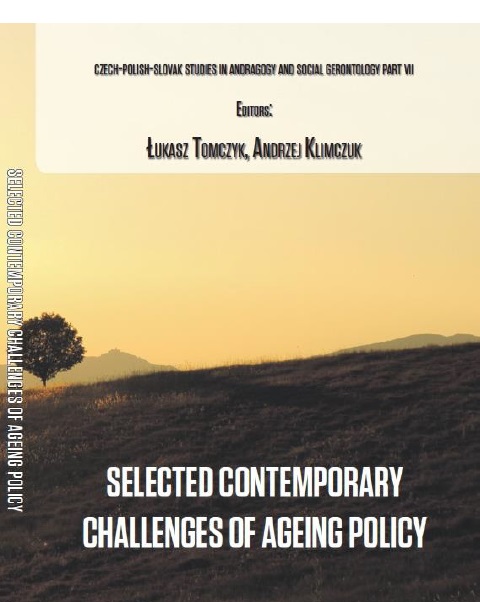Publikace „Vybrané aktuální výzvy politiky stárnutí“ (Tomczyk, Łukasz, and Andrzej Klimczuk, eds. 2017. Selected Contemporary Challenges of Ageing Policy. Kraków: Uniwersytet Pedagogiczny w Krakowie. ISBN 978-83-941568-7-9. DOI: 10.24917/9788380840911) je ze všech publikací v edici „Česko-polsko-slovenská studia Andragogiky a sociální gerontologie“ nejvíce mezinárodní. Autoři a autorky, kteří se pokoušejí zachytit trendy sociální politiky, mají odlišné pohledy, které vychází nejen z jejich znalostí o podpoře starších lidí, ale z odlišných škol sociální gerontologie, které reprezentují. V textech již sedmé publikace v této edici naleznete odlišné i společné prvky, které se týkají místních, regionálních a globálních politik v zemích, z nichž autoři pocházejí: Česká republika, Slovinsko, Litva, Lotyšsko, Polsko, Slovensko, Itálie , Turecko a Spojené státy.
Kapitoly ukazují řadu metodologických přístupů k vnímání sociální politiky a jejích nástrojů. V textech se vyskytují otázky související s otázkou aktivního stárnutí, diskriminace starších lidí na pracovišti, srovnatelnosti politik přátelských k zaměstnávání starších lidí v České republice, Polsku a na Slovensku, jakož i zaměření na význam různých forem vzdělávání – univerzity třetího věku, kluby seniorů a další formy neformálního vzdělávání podporujícího aktivní život ve stáří.
Tato monografie se také pokouší odpovědět na otázku, jak přenést téma mezigeneračního učení do praxe. Tato otázka je součástí kapitoly o zavádění mezigeneračních programů do zařízení poskytujících dlouhodobou péči a podporu. Publikace pojednává také o veřejné politice týkající se stárnutí v kontextu změn v posledních desetiletích (Slovinsko) a obsahuje ukázku politiky na zvýšení sebevědomí jako klíče k aktivnímu stárnutí (Turecko).
Doufáme, že sedmý ročník naší série bude intelektuálním podnětem k dalšímu mezinárodnímu výzkumu o změně sociální politiky a přispěje k šíření osvědčených postupů a přispěje k pozitivní společenské změně.
Stáhnout zdarma nebo zde či zde.
Obsah
JAROSLAVA HASMANOVÁ MARHÁNKOVÁ
Seductive Solutions, Inspiration, Easy-to-Remember Phrases, and Ambiguity: Why Is the Idea of Active Ageing so Successful?
VALENTINA HLEBEC, TATJANA RAKAR
Ageing Policies in Slovenia: Before and After “Austerity”
RŪTA BRAZIENĖ
Age and Workplace Discrimination in Lithuania
MAGDALENA LESZKO, BEATA BUGAJSKA
The Evaluation of Employment Policies for Older Adults in the Czech Republic, Poland, and Slovakia
ANGELIKA FELSKA
Folk High School as an Educational Alternative for Older Adults
ERIK SELECKÝ
Organization of International Educational Activities at the Universities of the Third Age
KRYSTYNA KAMIŃSKA
(Un)Obvious Education, or Complexities of the Polish Education Aimed at Older People
GIOVANNA DEL GOBBO, GLENDA GALEOTTI, GILDA ESPOSITO
Intergenerational Education for Social Inclusion and Solidarity: The Case Study of the EU Funded Project „Connecting Generations”
LĪGA RASNAČA, ENDIJA REZGALE-STRAIDOMA
Intergenerational Cultural Programs for Older People in Longterm Care Institutions: Latvian Case
DOGA BASAR SARIIPEK, SEYRAN GÜRSOY ÇUHADAR
Implementation of a “Self-Sufficient Ageing” Policy and Possible Challenges: Case of Turkey
This volume-„Selected Contemporary Challenges of Ageing Policy“-is the most international of all published monographs from the series „Czech-Polish-Slovak Studies in Andragogy and Social Gerontology.“ Among the scholars trying to grasp the nuances and trends of social policy, there are diverse perspectives, resulting not only from the extensive knowledge of the authors on the systematic approach to the issue of supporting older people but also from the grounds of the represented social gerontology schools. In the texts of Volume VII interesting are both distinct and coherent elements presenting the role of local, regional and global policies in the prism of the countries from which the authors originate: the Czech Republic, Slovenia, Lithuania, Latvia, Poland, Slovakia, Italy, Turkey, and the United States.
The chapters show a wealth of methodological approaches to the perception of social policy and its tools. In the texts there are issues related to the idea of active ageing, discrimination against older people in the workplace, comparability of solutions friendly to employment of older adults in the Czech Republic, Poland, and Slovakia as well as focused on the importance of educational forms (universities of the third age, senior clubs, folk high schools, and other non-formal solutions) determining an active life in old age.
This monograph also attempted to answer the question regarding how to transfer the idea of intergenerational learning into the realm of practice. This issue complements the chapter on the implementation of intergenerational programs in institutions providing long-term care support. The book also outlines a public policy on ageing in the perspective of the changes over the last few decades (Slovenia) and the case demonstrating solutions to accelerate self-reliance as a key to active ageing (Turkey).
We hope that seventh volume of our series will be an intellectual stimulus for further international research on change in social policy and will contribute to the dissemination of best practices as well as contribute to positive social change.
Keywords:
Active Ageing; Age Discrimination; Age Management; Ageing; Ageism; Alternative Education; Austerity; Care Services; Cultural Programs; Culture; Czech Republic, Slovenia, Lithuania, Latvia, Poland, Slovakia, Italy, Turkey, United States; Economic Crisis; Education of Older Adults; Employment Policies; Folk High Schools; Fourth Age; Generational Gap; Informal Care; Intergenerational Relationships Learning; Intergenerational Solidarity; International Cooperation; Labor Market; Lifelong Learning; Long-Term Care; Old Age; Older Persons Care; Older Workers; Policy Ideas; Protection Programs; Sociological Theory; Third Age; Turkey; University of the Third Age;

